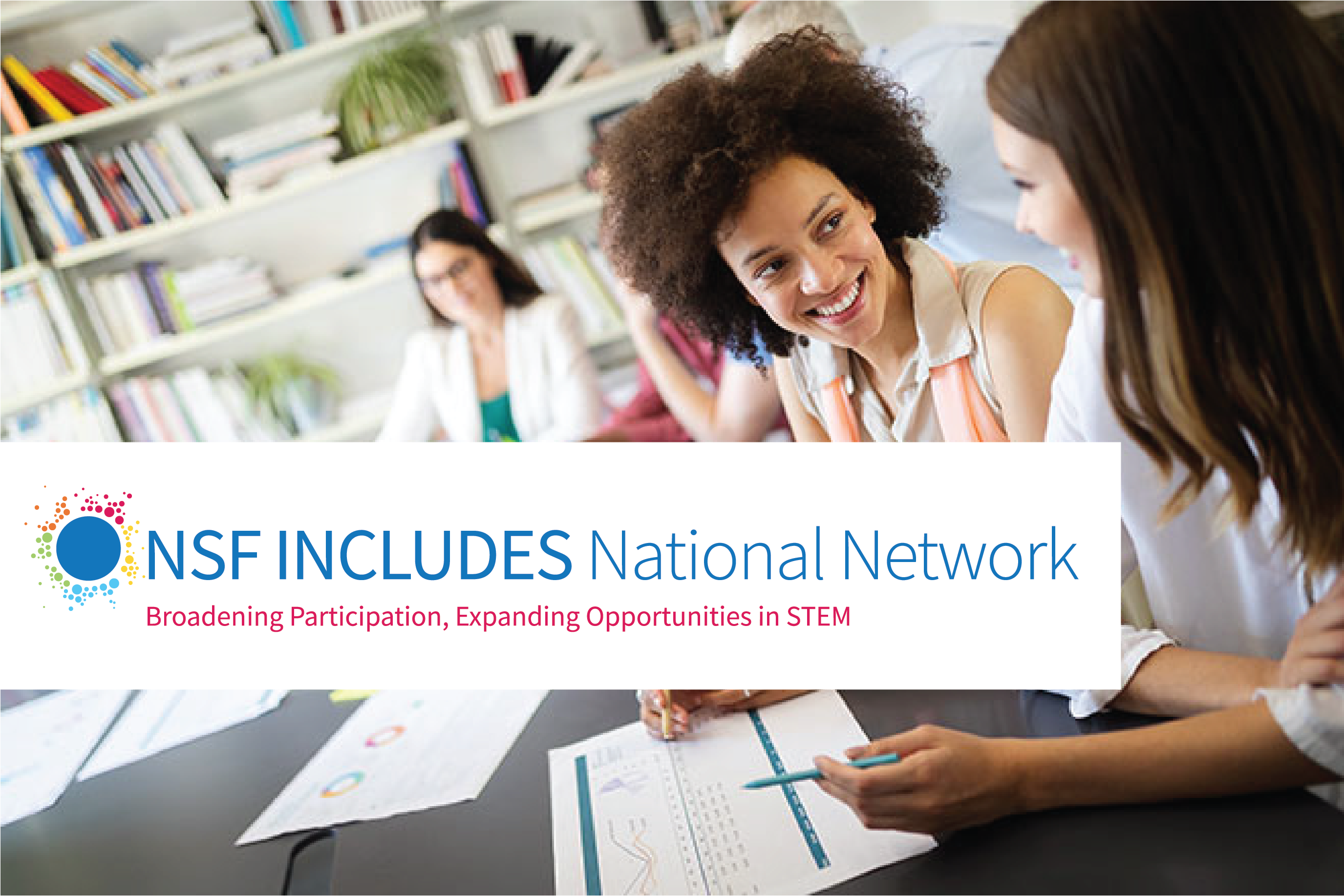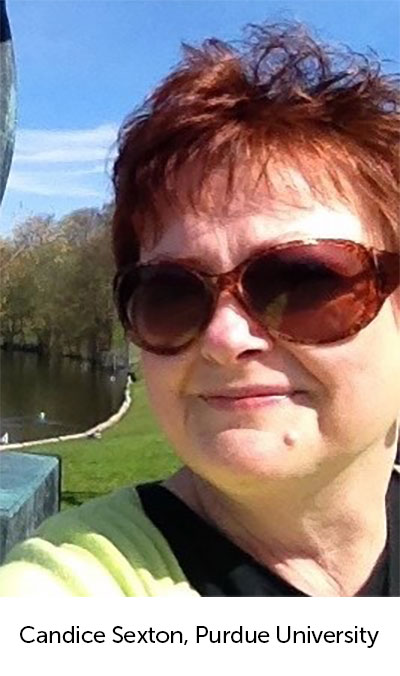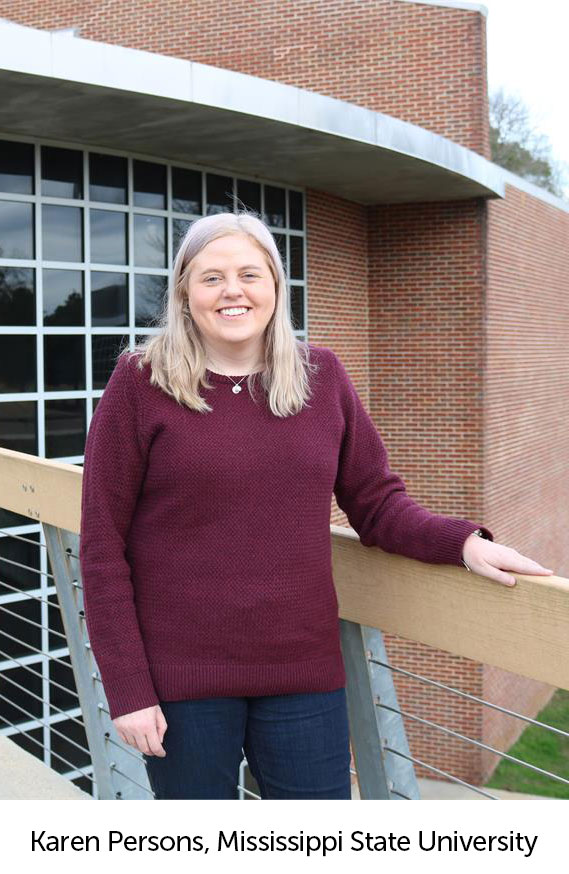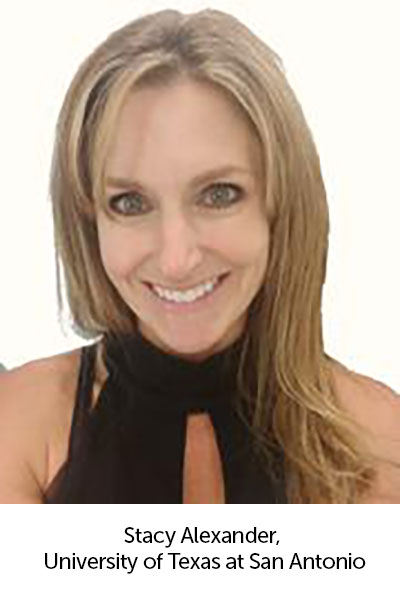by Jenna Rush
February 22, 2021

Repost of a January 13, 2020 post from the NSF INCLUDES National Network Blog. NSF INCLUDES (Inclusion Across the Nation of Communities of Learners of Underrepresented Discoverers in Engineering and Science) is a comprehensive national initiative designed to enhance U.S. leadership in discoveries and innovations by focusing on diversity, inclusion and broadening participation in Science, Technology, Engineering and Mathematics (STEM) at scale.
Broadening participation in the STEM workforce means taking into account non-traditional academic and career pathways. It can also mean welcoming back people who seek to return to or advance STEM career pursuits they had left behind to join the military, raise families, or for other reasons.
To more deeply understand women’s engagement in STEM, and their re-entry into the STEM workforce, the National Science Foundation in fall 2019 funded six traineeships to develop the STEM knowledge base, skills, and competencies of undergraduate and graduate students after a career break. These traineeships are partially funded by The Boeing Company as part of its Women Make Us Better and Women in Leadership Initiatives.
The six traineeships focus on providing training and professional development—including mentorship and leadership development—and offering internships and research experiences. They focus on applied sciences, skilled trades, and modern technologies and include fields such as advanced manufacturing, agriculture, computer and information science, energy, engineering, geospatial sciences, micro- and nano-technology, and safety and security. The four women we feature in this post are following their STEM dreams at different points in their careers.
Environmental Engineering at Saddleback College
Ashlee Lundgren was a Cybernetworking Specialist as a Sergeant in the Marine Corps. “I executed the creation and maintenance of tactical networks while leading 20–40 Marines,” she explained. Upon returning home from service, the challenges of being a disabled veteran, new mother, and spouse of an active-duty service member deployed 8-10 months a year could have seemed insurmountable to her re-entry into an educational program. Thanks to the traineeship, Lungren is now pursuing her Bachelor’s of Science in Environmental Engineering, with her sights on a new career in the water treatment industry.

Construction Management Technology at Purdue University
“I am very fortunate to return to my alma mater, Purdue University’s School of Construction Management Technology, as a Ph.D. student studying women in construction through this NSF INCLUDES program,” said trainee Candice Sexton. “As a returning woman student who has worked in the construction field in both the transportation sector and marketing/communications areas, this once-in-a-lifetime opportunity provides for my advanced education with the goal of increasing the long-term participation of women in the construction industry.”
Sexton’s doctoral activities have included observing a sophomore-level pre-construction management class, participating in Partnerships for Innovation-Research Partnerships project meetings with researchers and government, industry, and non-profit collaborators, and contributing to outreach activities with Girl Scouts and Women in Construction Management.
In the first semester of her traineeship, Sexton submitted an extended research abstract to the ASCE Journal of Management in Engineering Special Collection on Diversity and Inclusion in the Engineering-Construction Industry, completed a preliminary draft outline of her Ph.D. dissertation, and completed FireStarter Entrepreneurship training provided by the Purdue Foundry.

Improving Athlete Safety at Mississippi State University
At the Center for Advanced Vehicular Systems at Mississippi State, Dr. Karen Persons performs fatigue testing on the stretch foot-ankle wearable sensor solution, to determine the life cycle of the future smart sock that will be produced by the Athlete Engineering program for use by student athletes.
Her prior experience testing football helmet safety and role at the Athlete Engineering program landed her an invitation to attend the National Football League Helmet Challenge to collaborate with other researchers on advancing the safety of the game.
In addition, Dr. Persons plans to use her background in biological sciences and biomedical engineering to expand the use of the soft robotic stretch sensors from human to animal gait. This work will add a new division and research thrust to the Athlete Engineering research group. Dr. Persons is currently working on her second Ph.D. in Biomedical Engineering. Her first Ph.D. was in Biology.

Cybersecurity for the Internet of Things at the University of Texas at San Antonio
When Stacy Alexander became a part-time Master’s student in Electrical and Computer Engineering at the University of Texas at San Antonio in fall 2016, she thought that with a lack of childcare and tight budget, she would not earn her degree until late 2020. Instead, Alexander became a Ph.D. student in fall 2019 thanks to a traineeship, beginning her dissertation on the Internet of Things Cybersecurity (especially focused on connected vehicle security and protection).
Stacy had no research experience before conducting an independent study with her advisor in spring 2019. She has now conducted experiments on connected vehicle communication network penetration testing, and developed software to analyze in-vehicle network communication.
In addition to the four women featured here, students are also being supported at Iowa State University and Clemson University.
Thank you to the following people who contributed to this post: Mississippi State University, Karen Persons and Reuben Burch; Purdue University, Candice Sexton and Jiansong Zhang; Saddleback College, Ashlee Lundgren, Madeline Hernandez, and Gabe Hanzel-Sello; University of Texas at San Antonio, Stacy Alexander and Guen Chen.
Topics: Access and equity Adult learners Computer Science Engineering STEM and computer science pathways
